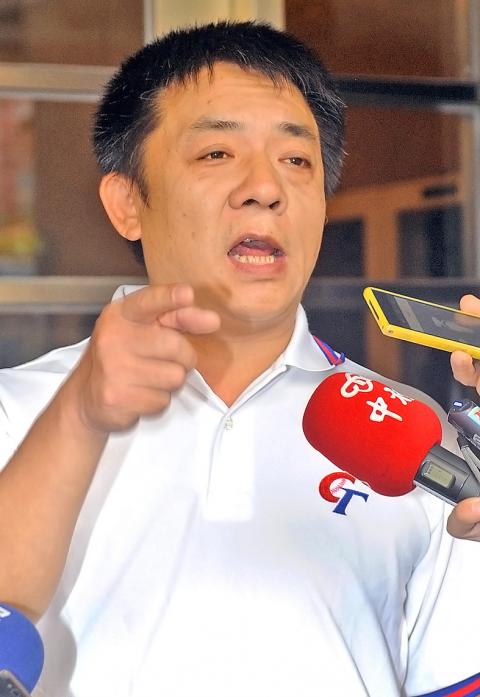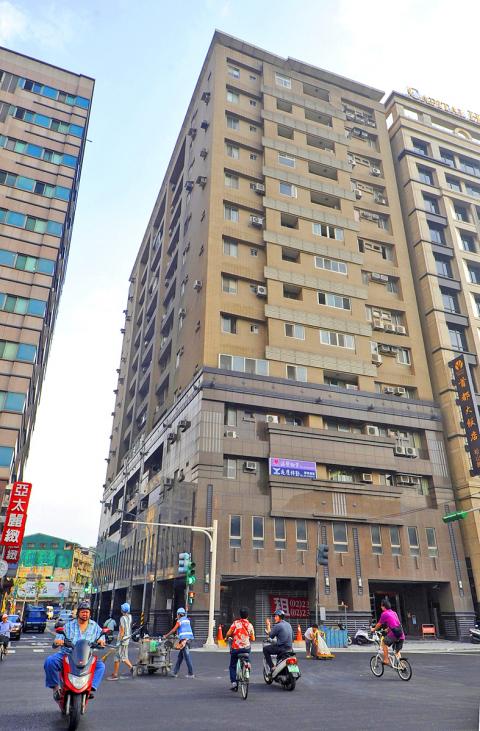The Supreme Court yesterday ordered a construction firm responsible for a building in Taipei that collapsed during the Sept. 21, 1999, earthquake to pay a total of NT$330 million (US$10.8 million) in damages to the building’s 170 residents, bringing a 15-year battle over compensation to a close.
The magnitude 7.3 earthquake caused 2,456 deaths nationwide, including 87 people in Taipei’s Tunghsing Building (東星大樓), which was at the corner of Bade Road and Hulin Street.
One hundred and seventy of the building’s residents filed a NT$2.8 billion civil lawsuit against its architect, Chang Tsung-hsin (張宗炘), now deceased; Hung Gu Construction (鴻固營造); Hsieh Lung-sheng (謝隆盛), the now-deceased former manager of original contractor Hung Cheng Construction (宏程建設), and the inheritor of his estate, Hsieh Wu Hsueh-hui (謝吳雪蕙); Hung Kuo Construction (宏國建設); and state-run First Bank.

Photo: Liao Chen-huei, Taipei Times
However, the claimants are unlikely to receive any payment, as the individual defendants are either deceased or out of the country, while the companies named in the case have cleared their assets, the lawyer for the plaintiffs said.
The collegiate bench said that based on reports by the Taiwan Professional Civil Engineers Association and the Executive Yuan’s Public Construction Commission, the building’s design was flawed, with the builders underestimating the weight per floor and the building’s total weight by 18 percent.
The horizontal force estimated in the event of seismic activity had been scaled down due to the miscalculations, so the number of reinforced concrete beams used per level was insufficient, the collegiate bench ruling report said.

Photo: Liao Chen-huei, Taipei Times
The stress levels of the concrete beams were insufficient and the length of the stirrup hooks securing the steel-reinforced bars were substandard, the report read, adding that the connecting joints had not been reinforced with stirrup hooks or the reinforced areas were not secured tightly, causing the entire building to slowly collapse.
Cheng Wen-lung (鄭文龍), a lawyer who has represented the residents since 2003, yesterday said that the ruling was “merely a formality,” as the companies or individuals charged with paying compensation were either dead, had left the country or cleared their assets.
Cheng said his clients would not receive any money aside from a national compensation of NT$120 million that the residents had settled out of court with the Taipei City Government in 2007.
Although the collegiate bench concurred with previous rulings that Chang, Hsieh and construction overseer Hsu Mao-hsiung (徐茂雄) should pay damages, Chang and Hsieh are dead, leaving Hsieh Wu and Hsu to shoulder the payment.
The court upheld the ruling that Hung Gu Construction president Tu Ming-fu (杜明福) and board members Lin Hsieh Han-chien (林謝罕見) and Lin Hung-ming (林鴻明) need not pay damages, as they were not part of the construction team.
It also exonerated First Bank from any responsibility, saying that the repairs the bank was conducting at the time did not the affect the building’s structural integrity.
Tu reportedly left the country in 2012.
Hsu was sentenced to 18 months in prison for professional negligence.
Additional reporting by CNA

INVESTIGATION: The case is the latest instance of a DPP figure being implicated in an espionage network accused of allegedly leaking information to Chinese intelligence Democratic Progressive Party (DPP) member Ho Jen-chieh (何仁傑) was detained and held incommunicado yesterday on suspicion of spying for China during his tenure as assistant to then-minister of foreign affairs Joseph Wu (吳釗燮). The Taipei District Prosecutors’ Office said Ho was implicated during its investigation into alleged spying activities by former Presidential Office consultant Wu Shang-yu (吳尚雨). Prosecutors said there is reason to believe Ho breached the National Security Act (國家安全法) by leaking classified Ministry of Foreign Affairs information to Chinese intelligence. Following interrogation, prosecutors petitioned the Taipei District Court to detain Ho, citing concerns over potential collusion or tampering of evidence. The

Seventy percent of middle and elementary schools now conduct English classes entirely in English, the Ministry of Education said, as it encourages schools nationwide to adopt this practice Minister of Education (MOE) Cheng Ying-yao (鄭英耀) is scheduled to present a report on the government’s bilingual education policy to the Legislative Yuan’s Education and Culture Committee today. The report would outline strategies aimed at expanding access to education, reducing regional disparities and improving talent cultivation. Implementation of bilingual education policies has varied across local governments, occasionally drawing public criticism. For example, some schools have required teachers of non-English subjects to pass English proficiency

NEGOTIATIONS: The US response to the countermeasures and plans Taiwan presented has been positive, including boosting procurement and investment, the president said Taiwan is included in the first group for trade negotiations with the US, President William Lai (賴清德) said yesterday, as he seeks to shield Taiwanese exporters from a 32 percent tariff. In Washington, US Trade Representative Jamieson Greer said in an interview on Fox News on Thursday that he would speak to his Taiwanese and Israeli counterparts yesterday about tariffs after holding a long discussion with the Vietnamese earlier. US President Donald Trump on Wednesday postponed punishing levies on multiple trade partners, including Taiwan, for three months after trillions of US dollars were wiped off global markets. He has maintained a 10 percent

TRADE: The premier pledged safeguards on ‘Made in Taiwan’ labeling, anti-dumping measures and stricter export controls to strengthen its position in trade talks Products labeled “made in Taiwan” must be genuinely made in Taiwan, Premier Cho Jung-tai (卓榮泰) said yesterday, vowing to enforce strict safeguards against “origin laundering” and initiate anti-dumping investigations to prevent China dumping its products in Taiwan. Cho made the remarks in a discussion session with representatives from industries in Kaohsiung. In response to the US government’s recent announcement of “reciprocal” tariffs on its trading partners, President William Lai (賴清德) and Cho last week began a series of consultations with industry leaders nationwide to gather feedback and address concerns. Taiwanese and US officials held a videoconference on Friday evening to discuss the